
-
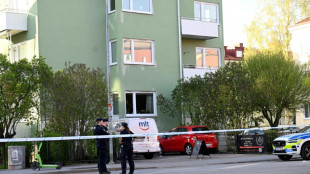 Sweden shooting kills three: police
Sweden shooting kills three: police
-
Real Madrid's Rudiger, Mendy out injured until end of season

-
 Dubois' trainer accuses Usyk of 'conning boxing world'
Dubois' trainer accuses Usyk of 'conning boxing world'
-
Femke Bol targets fast return after draining 2024

-
 Asterix, Obelix and Netflix: US streamer embraces Gallic heroes
Asterix, Obelix and Netflix: US streamer embraces Gallic heroes
-
Watson wins Tour de Romandie prologue, Evenepoel eighth

-
 Amazon says never decided to show tariff costs, after White House backlash
Amazon says never decided to show tariff costs, after White House backlash
-
India gives army 'operational freedom' to respond to Kashmir attack

-
 Stocks advance as investors weigh earnings, car tariff hopes
Stocks advance as investors weigh earnings, car tariff hopes
-
Canadian firm makes first bid for international seabed mining license

-
 Kardashian robbery suspect says heist was one 'too many'
Kardashian robbery suspect says heist was one 'too many'
-
'Chilled' Swiatek scrapes into Madrid Open last eight

-
 Interconnectivity: the cornerstone of the European electricity network
Interconnectivity: the cornerstone of the European electricity network
-
France accuses Russian military intelligence of cyberattacks
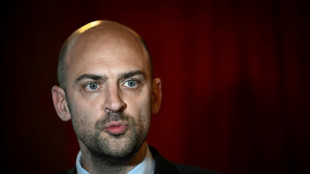
-
 Multiple challenges await Canada's Carney
Multiple challenges await Canada's Carney
-
US consumer confidence hits lowest level since onset of pandemic

-
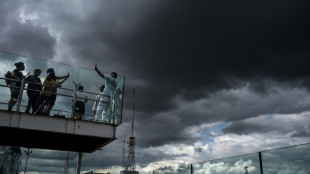 How climate change turned Sao Paulo's drizzle into a storm
How climate change turned Sao Paulo's drizzle into a storm
-
Video game rides conclave excitement with cardinal fantasy team

-
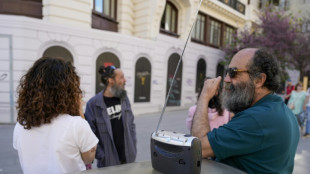 Candles and radios in demand in Spain as blackout lessons sink in
Candles and radios in demand in Spain as blackout lessons sink in
-
Boca Juniors sack coach Gago ahead of Club World Cup

-
 Trump celebrates tumultuous 100 days in office as support slips
Trump celebrates tumultuous 100 days in office as support slips
-
Forest face 'biggest games of careers' in Champions League chase: Nuno

-
 Stocks waver as investors weigh earnings, car tariff hopes
Stocks waver as investors weigh earnings, car tariff hopes
-
US climate assessment in doubt as Trump dismisses authors

-
 W. House slams Amazon over 'hostile' plan to display tariff effect on prices
W. House slams Amazon over 'hostile' plan to display tariff effect on prices
-
What we know ahead of conclave to elect new pope

-
 EU top court rules 'golden passport' schemes are illegal
EU top court rules 'golden passport' schemes are illegal
-
Mounds of waste dumped near Athens's main river: NGO
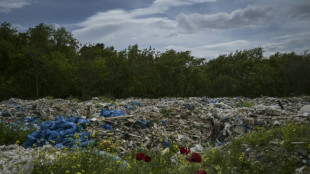
-
 Spain starts probing causes of massive blackout
Spain starts probing causes of massive blackout
-
France targets cheap Chinese goods with fee on packages

-
 Amnesty accuses Israel of 'live-streamed genocide' in Gaza
Amnesty accuses Israel of 'live-streamed genocide' in Gaza
-
Japan, Philippines leaders vow to deepen security ties
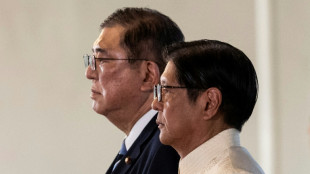
-
 AstraZeneca moves some production to US amid tariff threat
AstraZeneca moves some production to US amid tariff threat
-
Shadman's ton gives Bangladesh lead in 2nd Zimbabwe Test

-
 Barca's Yamal: I admire Messi but don't compare myself to him
Barca's Yamal: I admire Messi but don't compare myself to him
-
Pfizer profits dip on lower Paxlovid sales

-
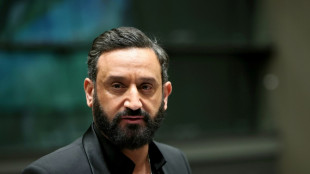 French right-wing TV host fans talk of presidential bid
French right-wing TV host fans talk of presidential bid
-
Two men in court charged with 'moronic' felling of famed UK tree

-
 Amnesty accuses Israel of 'live-streamed genocide' against Gazans
Amnesty accuses Israel of 'live-streamed genocide' against Gazans
-
Spotify posts record profit in first quarter

-
 Sciver-Brunt named as England women's cricket captain
Sciver-Brunt named as England women's cricket captain
-
GM profits top estimates, but automaker reviewing outlook due to tariffs

-
 Stock markets edge up as Trump softens tariff pain for auto firms
Stock markets edge up as Trump softens tariff pain for auto firms
-
Pricier trainers? Adidas warns on US tariff impact

-
 Spain, Portugal rule out cyberattack for massive blackout
Spain, Portugal rule out cyberattack for massive blackout
-
Suryavanshi, 14, dubbed India's next superstar after shattering records

-
 Power back in Spain, Portugal after massive blackout
Power back in Spain, Portugal after massive blackout
-
Pakistan says it shot down Indian drone along Kashmir border

-
 Cardinals run the media gauntlet ahead of conclave
Cardinals run the media gauntlet ahead of conclave
-
BP profit drops 70% amid pivot back to oil and gas


'Hostage situation': Egypt's decade-long rights crackdown
Ten years ago, Egypt's then-defence minister Abdel Fattah al-Sisi rallied citizens by promising to move the country out of the "terrorist" shadow of Islamist president Mohamed Morsi.
Today, the former general rules a nation where expressions of dissent have been quashed, the media is muzzled and the justice system is a labyrinth even legal experts say they cannot navigate.
Over the decades, Egypt -- the most populous Arab nation and a key US ally -- "was never a very liberal democracy", said Hossam Bahgat, founder of the Egyptian Initiative for Personal Rights.
But today's level of state repression is unprecedented, say rights activists.
For decades, Egyptian "activists and lawyers have been imprisoned for their opinions", said human rights lawyer Mahienour El-Massry.
Now, she said, "ordinary citizens are accused of terrorism because of a TikTok sketch or a Facebook post complaining about the cost of living".
The United States has accused Egypt, one of its top military aid recipients, of torture, "life-threatening prison conditions", free speech restrictions and the persecution of the LGBTQ community.
This week marks a decade since Sisi deposed Morsi in popular protests -- the last time Egyptians demonstrated en masse, after the overthrow of veteran ruler Hosni Mubarak in the 2011 Arab Spring.
Sisi assumed power a year later and has since tightened his grip on the nation of now 105 million people.
A decade on, said Bahgat, "the entire country lives in fear of arrest, open-ended detention with no due process.
"We went from self-censorship to the entire population living in a hostage situation."
- 'Zero demonstrations' -
On Egyptian streets that once echoed with protest chants, "there are literally zero demonstrations a year", Bahgat said.
"For the first time in Egypt there is not one single opposition newspaper, there is no way for the population to express dissent in an organised manner."
According to rights groups, 562 websites are now blocked, including of independent news outlets, non-profits and rights organisations.
Authorities regularly ban rap and electronic music performers and have prosecuted young female social media influencers for "violating family values".
Bahgat said Egypt has "turned into a carceral state. It is the worst decade in the modern history of the country when it comes to human rights".
Authorities point to reforms, including lifting a long-standing state of emergency, and a revived presidential pardoning committee that has released hundreds of political prisoners.
Long accused of brutal prison conditions, Egypt has opened new "rehabilitation centres" with libraries and workshops for inmates.
Under a new "national dialogue", former prisoners "speak to those within the institution, with much enthusiasm", according to its coordinator Diaa Rashwan.
But rights defenders -- many of whom have had their assets frozen and remain under travel bans -- label such gestures mere manoeuvres.
Measures once allowed under states of emergency have been streamlined into laws which "have been turned into oppression tools", said Bahgat.
"Even at the height of authoritarianism... the judiciary had to create a legal basis for abuse," he said. "That has ceased to exist."
- Caught in the system -
Today, the judiciary has been made compliant through the censures, transfers and promotions of judges that cement the loyalty of those left, activists say.
Egypt now ranks 135th out of 140 countries on the Rule of Law Index by the World Justice Project.
One of the many citizens caught up in the justice system is finance manager Samer al-Desouki, 32, who was arrested on the street over a year ago and remains in pre-trial detention, Bahgat told AFP.
While his family swore he had nothing to do with Islamists or the liberal opposition, his lawyers have been unable to access the file of the state security detainee.
An anti-terrorism court in the city of Damietta acquitted Desouki of "belonging to a terrorist organisation" three times last year.
And yet each time, Bahgat said, he was handed a new case number under the same charges that restarted the clock on his pre-trial detention.
Lawyers now attend their clients' detention hearings via video call in what was once a Covid safety measure.
Massry describes seeing "20 detainees on screen at once... flanked by guards, they can't talk about their conditions in detention."
There is no way to verify how many Egyptians are behind bars, and authorities refuse to release figures.
Rights monitors say that so far this year at least 16 inmates have died in state custody, at least five of them in new rehabilitation centres.
Massry can only report what she has seen during several past stints in detention. In 2016, the women's prison she was jailed in held around 30 political prisoners, she said.
When she was arrested again in 2019, she recounted, "there was an entire wing reserved for political cases, with some 200 people inside".
A.Rodriguezv--AMWN

